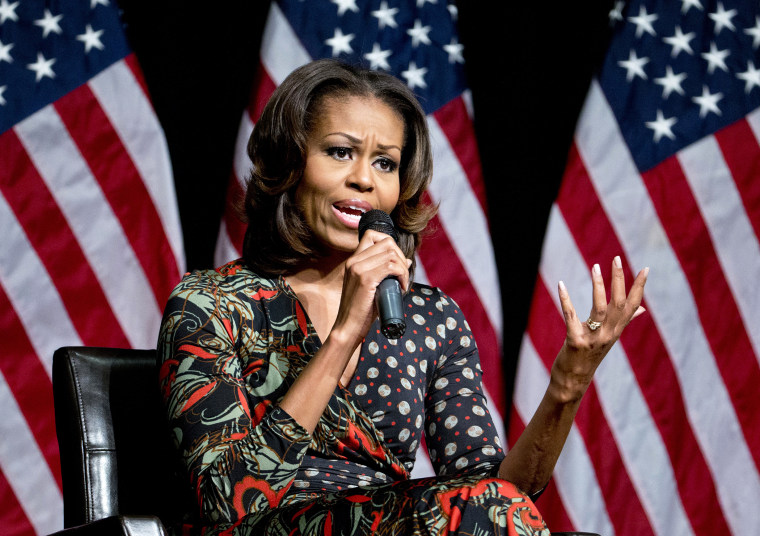First lady Michelle Obama waded into the education debate Tuesday, joining her husband's push to promote higher learning. And she showed that she's quite comfortable in her newly expanded role.
The first lady spoke to students at Bell Multicultural High School in Washington, D.C. about the importance of education, as part of the president's "North Star" goal, which seeks to help America top the rankings of college graduates by the year 2020.
America has slipped to 12th place by that measurement in recent years, with about 40% of Americans earning college degrees and advanced certificates today. That number will need to jump up to 60% to help America win back the top spot, according to data from the Department of Education. It's a lofty goal, but from the first lady's perspective, 12th place is simply "unacceptable."
"We've got a lot of work to do to turn that around and get back on top," she said, impressing upon the students the importance of taking responsiblity for their own education.
"The person with the biggest impact on your education is you," she said.
Few people are better suited to lead the conversation on education than the first lady, who went from the south side of Chicago to Princeton University. She explained that while she was lucky enough to have support at home, she didn't always find it in the classroom.
"At 6 a.m. every morning I had to get on a city bus and ride for an hour, sometimes more, just to get to school," she said. When she told her teachers that she dreamt of attending Princeton, some said she had set her sights too high.
"I still hear that doubt ringing in my head," she said. But she turned the "doubters" into motivators. "I used that negativity to fuel me, to keep me going, and in the end, I got into Princeton, and that was one of the proudest days of my life."
But achieving the Princeton acceptance she'd dreamed of wasn't enough. She still had to get the degree, and, in some ways, life was even more difficult once she got to school.
Transitioning to the "wealthy Ivy League environment," was, for the Chicago-born teenager, "sort of like landing on another planet."
While pursuing her dreams meant going to Princeton and eventually getting a law degree, the first lady acknowledged that particular course won't be the same for everyone. But, she added, some level of higher education is increasingly important to succeed in the U.S.
"When the year 2020 rolls around, nearly two thirds of all jobs in this country are going to require some form of training beyond high school," she said.
The dearth of college graduates has already had an impact on the U.S. economy, with 3 million jobs unfilled today because there simply aren't enough qualified applicants.
"I am hear today because I want you to know that my story can be your story," she said. “The details might be a little different, but so many of the challenges and triumphs will be just the same.”
Her more personal approach to the conversation was different than what we've heard from President Obama on education. His emphasis has been more on policy, from limiting tuition increases to putting more focus on science and math education. But the first lady's personal touch on the issue will hopefully help move the needle by inspiring students to take responsiblity for their education.
"It is not your circumstance that defines your future," she said. "It's your attitude. It's your committment. You decided how high you set your goals. You decide how hard you're going to work for those goals. You decide how you're going to respond when something doesn't go your way."
